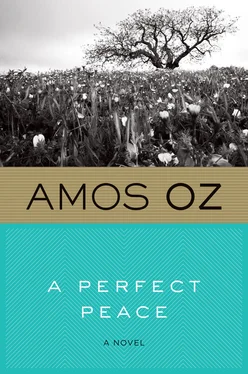"Excuse me," said Azariah Gitlin, "I'm afraid I'm getting everything wet."
"I'm the one who told you to sit, young man. Why are you still standing? Sit. Not here. Over there, by the heater. Why, you're soaking wet!"
Azariah Gitlin placed his guitar case by the chair Yolek pointed to and sat down stiffly and politely, taking care not to lean against its back. Suddenly he jumped up in alarm, removed his knapsack from his shoulder, and laid it with great care on the guitar case as though it, or the case, or both, contained some highly fragile object. Sitting down again as close as possible to the edge of the chair, he grinned at the sight of the puddle forming beneath him on the floor.
"Please excuse me," he began, "but are you Comrade Yolek? Could I possibly have a few minutes of your time?"
Yolek withheld an immediate answer. Gently, he settled his aching back into a padded armchair, stretched out his legs with infinite caution on a low footstool, and fastened the top button of his pajama top. Next he reached for the pack of cigarettes that lay on the coffee table to his right, extracted one of them, regarded it cunningly as if to show it he was nobody's fool, and then, with something like a wink, laid it back on the pack without lighting it. "Yes," he declared, turning his left ear toward his guest.
"I'm really not disturbing you? It's all right if I get right down, as they say, to brass tacks?"
"Please do."
"Well, then, first of all, please pardon my sudden appearance. My invasion, I should say. Not that I don't know that rules of formal etiquette have been abolished on the kibbutz, and rightly so, but I still must excuse myself. I came on foot."
"Yes," said Yolek.
"I walked all the way from the junction. It's a good thing no border raiders are out on a night like this."
"Yes, indeed," said Yolek. "So you're the new boy from the fruit-packing plant at last. Kirsch sent you to us."
"Not exactly."
"Eh?"
"I'm afraid 1 am someone else. I came to see about joining."
"What! You're not Kirsch's assistant?"
Azariah Gitlin looked down at the floor. Humbled. Disgraced. Lowest of the low.
"I see," said Yolek. "You are indeed someone else. I beg your pardon."
During the brief silence Yolek studied the pitiful creature seated across from him in wet socks, water streaming off it like sweat on a hot summer day. He noticed the long, sensitive fingers like those of a girl, the frail shoulders, the elongated face, the restless expression, the green eyes that betrayed some basic fear or despair. He reached for his cigarette once again, turned it around suspiciously to compare its two ends, and tamped it gently between his fingers. With his other hand, he pushed the pack toward the guest.
Azariah Gitlin snatched a cigarette, planted it in his mouth, thanked Yolek for it, thanked him once again for the lighted match he extended, and began to talk in a rush, swallowing his words, despairing of sentences halfway through and beginning new ones, gesturing continually with his hands, not daring to pause even to inhale. He was from Tel Aviv, a socialist by conviction, but sociable too, an orderly, hard-working type. His name, if he hadn't mentioned it yet, was Azariah Gitlin. A few weeks ago — three, or three-and-a-quarter, to be exact — that is, roughly twenty-three days ago, he had been discharged from the army. Honorably discharged. He had a document to prove it. In writing. No, he had never been to a kibbutz before, not even on a visit. Except once, when he happened to spend two hours at Kibbutz Bet-Alfa. But what were two hours? Not enough time to skin a cat, so to speak. Besides, he had had a good friend in the army, a young boy from Kibbutz Ginegar, who had tried to kill himself in the quartermaster's office and whose life he, Azariah, had saved at the last minute.
Not that any of this really mattered, by the way. All these details were, so to speak, incidental. The main thing was that he had developed an interest in the history of the kibbutz movement. He had talked to many people about it and had read a number of essays and even a novel — and, of course, Comrade Lifshitz's pamphlet Facing the Future —so that he was by no means a stranger to the subject and had some idea who he had the honor to be speaking with. Was he truly not disturbing him? The fact was that he felt nothing but contempt for people who made pilgrimages to famous men's homes simply to rob them of their time.
Family? No, he had none. That is, he had no brothers or sisters, and, for the time being, no wife or children either. When could he have had the time to start? All he had were some distant relatives, some refugees from Europe. No, he positively preferred not to discuss them. Some people were best not talked about. Mum's the word, so to speak. "The shorter the line, the straighter. The fewer the words, the greater." And so he would waste no more of them. He simply wished to be accepted by Kibbutz Granot. To strike roots in its soil, so to speak. That is, he wanted to be part of a communal enterprise. Incidentally, the day after his release from the army, three-and-a-quarter weeks ago, he had registered as a member of the Labor Party.
Yes, he had all kinds of ideas, he read a lot too, and he even had written a few things of his own. Nothing special. Poems, yes. Some prose. A few theoretical pieces. No, he hadn't tried publishing them. Still, the plain fact was that two days ago, well after midnight, he had sat alone at a table with a cup of coffee and had run his finger blindly over a list of all the kibbutzim in Israel. Wherever it landed, he had decided, was where he would go. "It's fate that steers the horse that veers." Take Spinoza, for example. A thousand years ago he had wisely written that although human beings come into this world ignorant of the reason for their existence, each one of them is born with the desire to realize what is best for himself. And that is how he had ended up this evening at Kibbutz Granot.
With all his experience in the realms of both ideology and practical politics, Comrade Yolek must surely have encountered events that seemed at first glance to be pure coincidence, yet that, once contemplated philosophically, revealed their predestined character. That too was an idea of Spinoza's. Need he, Azariah, apologize for using the arguments of a philosopher excommunicated by his fellow Jews?
"If you'll excuse me for saying so, Comrade Yolek, the ban on Spinoza was an act of gross injustice, so to speak, whereas the kibbutz was established to put an end to injustice in all things."
A profession? In all honesty he had to admit he didn't yet have one. When could he have had the time to acquire one? He had only been out of the army for twenty-three days. It would make him happy to be taught some agricultural skill like wheat growing or wine culture that would allow him to contribute to society. Even the broken clock is right twice a day.
His job in the army? A technical sergeant, a specialist in halftracks, although, to be honest, that was not his official rank but only an acting one. Not that it mattered. By the way, he had no demands. A roof over his head and three square meals a day, as they say. Perhaps a little pocket money, as is customary on kibbutzim.
No, he knew no one at Granot except for a splendid young man who told him the way to Yolek's house with great patience. Yes, of course, he understood that a kibbutz was not a summer camp. The hammer that shatters glass tempers steel, as they say. In all honesty and frankness, he should point out that he was accustomed to the harshest conditions and most backbreaking work. Not only had he just left the army but as a child in Europe he had grown up under Hitler's boot. No job, if you asked him, could be too difficult in a place where one could go to work every day with a sense of joy and community. If he wasn't mistaken, that was the whole idea of the kibbutz. In a word, he would gladly do whatever was asked of him. He wasn't choosy or spoiled. On the contrary, it might well be said that he was tough as nails. During the war, Stalin had put it to the Russian people bluntly. "Each of you wants to eat, get off your butt and on your feet!" Pozhalusta.
Читать дальше












